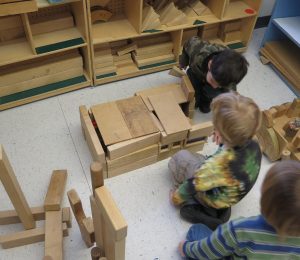If you’re considering French immersion for your child, you’re not alone. In recent years, English-speaking parents enrolling kids in public-school French immersion programs in Canada has increased steadily, from around 8 per cent of eligible students in 2011/12 to more than 11 per cent in 2016/17.
You might opt for French immersion for many reasons: the program may have a great academic reputation, you may want your child to attain near-fluency in another language or just feel that learning a second language will be beneficial—or your child might show interest in French.
Whatever your reasons, there are some important things to consider before you enrol your child in a French immersion program, in answer to the most common French immersion FAQs from parents.
1. French immersion is designed for kids who don’t speak French at home.
As well, communication between the school and parents is in English—something many parents are unaware of at first. Some kids may have at least one French-speaking parent, and that can be an advantage for those kids. But, as Lori Peck—the program facilitator in charge of FSL for the Durham District School Board—told us, it’s all relative: “If a child has a parent who’s a scientist, they might come in with more knowledge in science because they’ve already developed that interest.” And language aside, some kids will always get a bit more support or help at home than others.
Bottom line: There are no expectations for parents to know or learn French. There are many English-language resources available to parents. These include the French Language Learning Resources below, plus school orientations, meet-the-staff nights, and parent–teacher conferences.
2. French immersion may be more work for you.
If your child needs extra help, you may have to be proactive in finding resources or private tutors. Some parents even take French language classes themselves.
It’s important that parents have some interest in French. And you want both parents behind the program, says Catherine Roper, Coordinating Principal–Elementary Education for the Peel District School Board: “If one parent really wants it and one doesn’t, [that] could cause a problem.”
Parental involvement is one of the most important factors determining whether a child will be successful in any program, however; not just French immersion.
Bottom line: You don’t have to learn French yourself, but your child will benefit if you show an interest in what they are learning. Find ways to use French outside of school: through summer camp, community activities, French books, and French TV programs.
3. Will your kid thrive? It depends.
Studies show and teachers report that kids who do well in school in general will probably do well in French immersion. Kids who struggle in school will struggle in French immersion. Pretty basic, right?
That said, many educators express the same sentiment as Natalie, a Grade 5 French immersion teacher, who told us, “Encourage the love of reading in your family’s first language. Kids who love to read have an easier time picking up a second or third language and its vocabulary.”
Personality matters, too. If your child had trouble adjusting to kindergarten or is hesitant to try new things, it may be doubly difficult to move to a new school again or engage in a longer commute. You should also take into account whether your child’s other interests will be met. And if your child is gifted or has special needs, that’s a separate consideration.
Still, says Lori Peck, “Learning another language benefits all students. We teach the same literacy skills—just in a different language.”
Bottom line: You know your child best. Talk to your child’s JK teacher to get a second opinion based on how your child is doing at school—which could be much different than how they are at home.
4. Every school is different.
Some schools have homework clubs or tutoring; others don’t. Certain teachers may connect better with your child individually. A particular administration may be exceptionally skilled at advocating for struggling students.
Non-French-specific programs and facilities matter, too. Ultimately, many variables play into whether French immersion in general or a particular school’s program will be a good fit for your child.
Bottom line: Go to information sessions at the school you’re considering and be prepared with a list of questions. Get a feel for the level of support and communication.
5. Statistically, English skills don’t suffer—at least, not long-term.
Parents report that their kids’ English-language spelling is not so hot for a year or two, or kids may have trouble with things like capitalization. But by the end of grade 6 (for kids enrolled in early immersion) English language skills are the same or better than those of English-language-school counterparts.
Bottom line: Don’t sweat minor English-language difficulties before grade 6.
6. Early immersion students do have an advantage.
Early immersion programs begin between senior kindergarten and grade 2, depending on your school district. But your child may be able to start Core French around grade 4 (again, specifics depend on your school district) and transfer to French immersion in middle school or even high school. That can work well for kids who have a keen interest in French.
But studies have shown that children who start earlier do have a better and fuller understanding of the language. French immersion is still beneficial for kids who start later—just as learning any language would be—but they likely won’t enjoy as many advantages as the early immersion students.
Bottom line: Early immersion students may be “more fluent” in the long run, but later immersion is still beneficial, and can even work better for some kids.
7. It’s not all about French.
French immersion schools are also just schools, with lots of subjects that happen to be taught in French. So be sure to consider not only the French instruction at your target school, but the quality and availability of other programs.
Look at the quality of STEM subjects, the arts, sports, facilities like gymnasiums and playgrounds, music programs and after-school clubs your child might enjoy. If your child has tested as gifted or has special educational needs, it’s important to find out if those programs are available. Some districts only have them for kids in the English-language stream.
Bottom line: Look at the big picture and know what programs are offered outside the French-immersion classroom.
French Learning Resources for Kids and Parents
There are many resources available for kids and parents to help with homework, provide tips for parents, and get kids using and enjoying French outside of the classroom. These include:
- FSL Homework Toolbox: homework help website designed specifically for English-speaking parents of kids in French Immersion
- Voilà Learning: online homework help (free), French homework clubs, and one-on-one tutoring
- Canadian Parents for French: multiple resources and links to third-party resources for parents and students; link to provincial and local branches for more targeted community-level resources
- Treasure Chest for Parents New To French Immersion: PDF booklet for parents, from the Durham District School Board—a good primer for parents, with helpful phrases, tips, and a wealth links to extra resources for kids and parents
- MiniTFO online: educational French videos and games for kids ages 2–8
- Mango Langauges: language-learning software available for free at many public libraries and through some schools
- The public library: the library is a great place for free homework help and resources in print and online, downloadable e-books, programs and classes, French storytimes, French clubs, and more. Contact your local library to find out what’s available.
There are many, many more tools available, from French apps for kids to websites that check your grammar to French-language bookstores. The resources listed above have additional links to specifics sites for whatever you may need.





